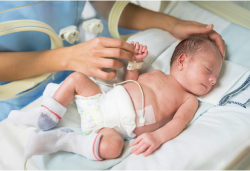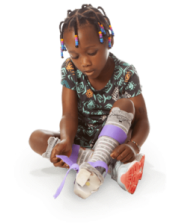Understanding neonatal infection causes
 Neonatal infection causes include bacteria, viruses, fungi, and parasites. Because a newborn’s immune system is still developing, even minor infections can become severe if not diagnosed and treated quickly.
Neonatal infection causes include bacteria, viruses, fungi, and parasites. Because a newborn’s immune system is still developing, even minor infections can become severe if not diagnosed and treated quickly.
Infections in newborns develop within the first 28 days of life and can occur before birth, during delivery, or shortly after. In some cases, harmful pathogens are introduced during labor or delivery due to medical negligence.
- Escherichia coli (E. coli)
- Group B strep (streptococcus) or GBS
- Herpes simplex virus (HSV)
- Klebsiella species
- Listeria monocytogenes
- Staphylococcus aureus, including MRSA
- Syphilis (Treponema pallidum)
These germs can lead to serious complications — especially if diagnosis or treatment is delayed. In these cases, families often take legal action.
Many birth injury lawsuits result in multimillion-dollar payouts, helping families cover medical care, therapy, and other lifelong expenses.
We partner with birth injury lawyers nationwide who have secured over $1 billion for families.
Find out if we can help your family, too. Get a free case review right now.
Top facts on neonatal infection causes and complications
- Group B strep is a major cause of neonatal infections. Pregnant women can pass GBS to their babies during delivery if not properly screened and treated.
- Newborn sepsis (blood infection) is a serious complication of neonatal infections caused by bacteria like GBS or E. coli.
- Premature babies face a higher risk of neonatal infections. Infants born preterm or with low birth weight have weaker immune systems, making them more vulnerable.
- Early-onset infections occur within 72 hours of birth and are often caused by bacteria passed from the mother during labor or delivery.
- Late-onset infections develop after the first week of life and may be linked to IV lines, neonatal intensive care unit (NICU), or exposure to unclean medical equipment.
- Conditions like cerebral palsy (CP), hearing loss, and developmental delays can result from untreated infections.
- Proper medical care can prevent many neonatal infections. Screening pregnant women for maternal infections and proper hygiene in hospitals can significantly reduce risk.
What causes neonatal infection?
While the underlying neonatal infection cause is usually exposure to bacteria or viruses, certain situations often play a role in how those pathogens reach a newborn.
- Maternal infections: Conditions like chorioamnionitis, syphilis, or herpes simplex virus can pass from the mother to the baby during pregnancy or delivery.
- Premature rupture of membranes (PROM): If the amniotic sac breaks too early, bacteria can enter the uterus and cause infection.
- Preterm birth or low birth weight: Babies with underdeveloped immune systems are more susceptible to infection.
- Hospital-acquired infections: Pathogens may be introduced through catheters, IV lines, or prolonged NICU care if proper hygiene protocols aren’t followed.
- Improper infection control: In rare cases, lapses in sterile technique during delivery or newborn care can increase the risk of infection.
Understanding neonatal infection causes can help families learn how a baby became seriously ill and whether it could have been prevented.
Risk factors for neonatal infections
In addition to direct neonatal infection causes, certain conditions can increase a newborn’s risk of developing a serious infection.
These risk factors may make it easier for harmful pathogens to enter the body or harder for a baby’s immune system to respond.
- Acidosis, a condition that can make it harder for the body to fight infection
- Existing maternal infections, such as hepatitis or syphilis
- Fetal distress, including abnormal heart rate or breathing problems before delivery
- Low birth weight (less than 5.5 pounds)
- Metabolic disorders, which may impair immune function
- Openings or damage to the skin or lining of the mouth or nose, allowing germs to enter
- Premature birth (before 37 weeks gestation)
- Problems in the digestive or urinary tracts, making it easier for bacteria to get into the baby’s bloodstream
- Prolonged rupture of membranes (water breaking more than 18 hours before delivery), which increases the risk of infection
- Use of invasive or potentially harmful medical equipment, like catheters, forceps, or vacuum extractors
Many of these risk factors linked to neonatal infection causes are manageable with proper medical care. When missed or poorly handled, neonatal infections may occur — and some can lead to long-term harm.
If a health care provider failed to manage known risk factors and your baby developed a serious infection, you may be able to seek compensation through a birth injury lawsuit.
Get a free case review right now to see if you may qualify.
Symptoms of infection in newborns
Early signs of newborn infections can be easy to miss. A baby might have a slightly lower heart rate, seem sleepier than usual, or have shorter feedings. Breathing may also change.
If the mother had an infection or her water was broken for a long time before delivery, the baby should be monitored more closely. At the first sign of concern, the doctor should order tests right away.
- Apnea, or pauses in breathing
- Bradycardia, a slow heart rate
- Fever or unusually low body temperature
- Jaundice, marked by yellowing of the skin or eyes
- Lethargy, or low energy and reduced movement
- Poor feeding or refusal to eat
- Rapid or difficult breathing
- Seizures or abnormal body movements
If your baby had any of these symptoms and the infection wasn’t diagnosed or treated in time, or if you’re now questioning whether something went wrong, our labor and delivery nurses are here to help.
Connect with one of our registered nurses at no cost.
Types of neonatal infection linked to birth injuries
Some infections can be especially dangerous for newborns, especially when doctors fail to recognize risk factors, diagnose symptoms, or begin treatment early. If medical providers miss key warning signs, these conditions can lead to birth injuries or even death.
- Encephalitis: Inflammation of the brain, often caused by viruses like herpes simplex
- Meningitis: Infection of the brain and spinal cord, sometimes leading to permanent brain damage
- Neonatal conjunctivitis: Eye infection that can cause swelling, discharge, and, in rare cases, vision loss
- Neonatal sepsis: Life-threatening bloodstream infection from bacteria such as GBS or E. coli
- Pneumonia: Lung infection that can make breathing difficult and may require intensive care
When these infections are not caught or treated in time, the results can be devastating. In some cases, neonatal infection causes are related to medical negligence, and you may be able to take legal action through a birth injury lawsuit.
How are newborn infections diagnosed?
When doctors suspect a newborn has an infection, they must act quickly. Delays in testing or diagnosis can allow the infection to spread, increasing the risk of complications or long-term harm.
Common diagnostic tools for neonatal infections include:
- Blood cultures, to identify the specific bacteria or pathogen causing the infection
- C-reactive protein (CRP) tests, which measure inflammation levels in the body
- Chest X-rays, used to detect pneumonia or fluid in the lungs
- Lumbar puncture (spinal tap) to check for meningitis by analyzing cerebrospinal fluid
Unfortunately, complications from neonatal infections don’t always show up right away. Many children seem to be developing normally at first, only to start missing milestones years later.
“Infections can lead to developmental delays, especially in premature babies. Many children aren’t fully diagnosed until age two or even at school age. They might seem to be developing on track at first, but delays often become noticeable later.”
— Andi Lowe, Cerebral Palsy Guide on-staff registered nurse
Sending a newborn home before 48 hours of age can be risky when certain infection risk factors are present, such as an untreated GBS-positive mother.
By the time symptoms appear, the infection may have already progressed to sepsis, breathing problems, or even brain injury.
Accurate and timely diagnosis is critical. If a newborn infection was missed or mismanaged and your child was harmed, you may be able to pursue a birth injury lawsuit.
Compensation from a birth injury settlement can help cover the cost of medical care and ongoing treatment.
Treatment options for neonatal infections
The treatment for a neonatal infection depends on the type and severity of the illness. Prompt care is essential to reduce the risk of long-term complications.
- Antibiotics to treat bacterial infections like sepsis or pneumonia
- Antiviral medications, used for infections caused by viruses such as herpes simplex
- Intravenous fluids to maintain hydration and support organ function
- Oxygen therapy to help with breathing difficulties
- Supportive care in the NICU, including respiratory support or monitoring
Early and appropriate treatment is critical to prevent serious complications and protect your baby’s long-term health.
Complications from untreated neonatal infections
When a neonatal infection isn’t diagnosed or treated quickly, it can lead to permanent harm. Complications may not appear right away but can affect a child’s development and quality of life over time.
“Some neonatal infections may require strong antibiotics after birth, which can lead to hearing loss. We often see speech delays later on that trace back to infections present during pregnancy or delivery.”
— Kristin Proctor, Cerebral Palsy Guide on-staff registered nurse
Common complications of untreated neonatal infections include:
- Brain damage, often caused by swelling, inflammation, or lack of oxygen
- Cerebral palsy, which can develop if the infection affects certain areas of the brain
- Developmental delays, including speech, motor, or cognitive challenges
- Hearing loss, sometimes linked to certain antibiotics or infections like meningitis
- Respiratory distress, which may require long-term breathing support
- Septic shock, a life-threatening response to infection that can cause organ failure
If your child had an infection at birth and you're concerned about their development, you probably have a lot of questions. Our nurses are here to help.
Connect with one of our labor and delivery nurses now — there’s never any cost to talk with our team.
Get legal help for a neonatal infection birth injury
When a newborn infection is caused by medical negligence, families are often left facing a lifetime of challenges they could never have prepared for.
If your child was harmed by an infection due to a delayed diagnosis, improper care, or failure to treat known risk factors, you may be eligible to file a birth injury lawsuit.
Compensation can help pay for medical expenses, ongoing therapies, and the long-term support your child needs. It can also give your family the financial stability to plan ahead with greater confidence.
Cerebral Palsy Guide partners with top lawyers and law firms who can help families in all 50 states. Together, they have recovered over $1 billion for families affected by preventable birth injuries, including newborn infections.
Call our trained patient advocates at (855) 220-1101 or get a free case review right now to find out if we can help.






